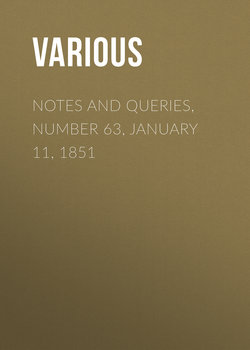Читать книгу Notes and Queries, Number 63, January 11, 1851 - Various - Страница 6
NOTES
OLD ENGLISH ACTORS AND MUSICIANS IN GERMANY
Оглавление(Vol. ii., pp. 184. 459.)
The following extracts furnish decisive evidence of the custom of our old English actors' and musicians' professional peregrinations on the continent at the beginning of the seventeenth century—a subject which has been ably treated by Mr. Thoms in the Athenæum for 1849, p. 862.
In September, 1603, King James I. despatched the Lord Spenser and Sir William Dethick, Garter King-at-arms, to Stuttgart, for the purpose of investing the Duke of Würtemberg with the ensigns of the Garter, he having been elected into the order in the 39th year of the late Queen's reign. A description of this important ceremony was published at Tubingen in 1605, in a 4to. volume of 270 pages, by Erhardus Cellius, professor of poetry and history at that University, entitled: "Eques auratus Anglo-Wirtembergicus." At page 120. we are told that among the ambassador's retinue were "four excellent musicians, with ten other assistants." (Four excellentes musici, unà cum decem ministris aliis.) These performed at a grand banquet given after the Duke's investiture, and are described at p. 229. as "the royal English music, which the illustrious royal ambassador had brought with him to enhance the magnificence of the embassy and the present ceremony; and who, though few in number, were eminently well skilled in the art. For England produces many excellent musicians, commedians, and tragedians, most skilful in the histrionic art; certain companies of whom quitting their own abodes for a time, are in the habit of visiting foreign countries at particular seasons, exhibiting and representing their art principally at the courts of princes. A few years ago, some English musicians coming over to our Germany with this view, remained for some time at the courts of great princes; their skill both in music and in the histrionic art, having procured them such favour, that they returned home beautifully rewarded, and loaded with gold and silver."
(Musica Anglicana Regiæ, quam Regius illustris Legatus secum ad Legationis et actus huius magnificentiam adduxerat: non ita multos quidem sed excellenter in hac arte versatos. Profert enim multos et præstantes Anglia musicos, comœdos, tragædos, histrionicæ peritissimos, è quibus interdum aliquot consociati sedibus suis ad tempus relictis ad exteras nationes excurrere, artemq'; suam illis præsertim Principum aulis demonstrare, ostentareq'; consueverunt. Paucis ab hinc annis in Germaniam nostram Anglicani musici dictum ob finem expaciati, et in magnorum Principum aulis aliquandiu versati, tantum ex arte musica, histrionicaq'; sibi favorem conciliârunt, ut largiter remunerati domum inde auro et argento onusti sint reversi.)
Dancing succeeded the feast and then (p. 244.) "the English players made their appearance, and represented the sacred history of Susanna, with so much art of histrionic action, and with such dexterity, that they obtained both praise and a most ample reward."
(Histriones Anglicani maturè prodibant, et sacram Susannæ historiam tanta actionis histrionicæ arte, tanta dexteritate representabant, ut et laudem inde et præmium amplissimum reportarent.)
W.B.R.
[See, also upon this subject, a most interesting communication from Albert Cohn in the Athenæum of Saturday last, January the 4th.]
